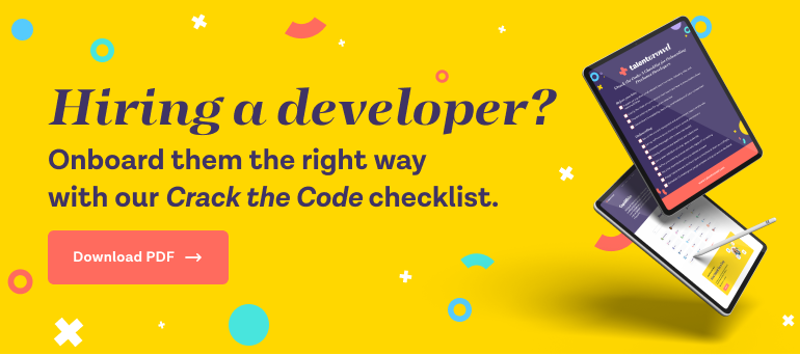Are you a software developer looking for a programming job specializing in Golang? If you are wondering how to prepare for an upcoming interview and what questions you should be able to answer, you've come to the right place!
This article will outline ten common questions interviewers might ask you about using Golang when applying for a software position. This article won't get as detailed with topics like code point, concurrent data access, specified explicit type, or command line arguments. Still, we'll review what you should know for interview questions. In addition to explaining the answers, we'll give you three tips to help you prepare for your interview and show you the easiest way to start searching for Golang jobs.
So what are we waiting for? Let's dive right in!
1. What is Go?
Go is an open-source programming language. It's commonly referred to as "Golang," a moniker that arose because of the original website, golang.org. Both names are used interchangeably. Robert Griesemer, Rob Pike, and Ken Thompson invented and developed this programming language at Google in 2007. The Golang programming language was created as an alternative to C++ and designed as a simple, reliable software that would fill in the gaps that other languages left behind, as well as many other functions.
This statically typed programming language is similar to C++, with a few notable changes, including improved runtime efficiency and actual variable declaration. Golang language differs from other programming languages in that it is constructed from packages and comes with built-in memory safety and management, garbage collection, and structural typing-- all without the need for a virtual machine. It's the same type of program as C++, but much improved and more efficient.
Go open source programming language is user-friendly, run-time efficient, and can be compiled for any other operating system.
This programming language is common in large software systems and is used by major companies such as Google, Uber, Dropbox, Netflix, American Express, and more.
2. What advantages does Go have over other programming languages?
The shining feature that sets this general-purpose system programming language apart from others is that it is not dependent on a virtual machine. Because of this, Go offers a quicker run time, superior portability, simple maintenance, and shorter development cycles.
Speed
With Go programming language, your code is compiled into data your computer knows how to run-- leaving no need for a virtual machine to interpret or assign values. Conversely, with other programming languages, computers need the assistance of virtual machines-- making these options "interpreted" languages. Golang's independence from virtual machines and the lightweight data structure results in faster compile times.
Compiling is one of many areas where Go saves developers time. Easy-to-write unit tests and overall quick turnaround means the development cycle is shortened. As a result, Go programming offers a fast way to create efficient software.
Portability
The Go programming language can be compiled for any operating system, not just the one in which it was created. Go offers superior portability, which means the application can build remotely no matter where you or your code may travel. For example, a developer can write a Go program on a Mac and give it to a friend, who can run the program on his Windows computer without a problem. This makes the Go programming language a user-friendly and efficient software for developers.
Maintenance
Go code is simpler to maintain because Go is a relatively easy programming language to learn. Developers adjust quickly and learn to manage and maintain applications free from unnecessary complications.
3. What is a package in a Go program?
A package is an organized piece of precompiled code that performs a specific function. Developers can write a package for a particular function and upload it to the Go standard library. Because Golang is open-source, this information can be accessed by other devs looking for similar solutions.
Let's say you want your application to send an email. Option one would be to code that command yourself. Option number two would be to search for pre-made package objects with similar functions. Once you find a package that does what you want, simply download it to achieve your desired outcome.
Another term you might come across is "package main import." The main import package is the designated starting point for a Go program.
4. Is the Go language case sensitive or insensitive?
Go programming language is case-sensitive. Developers need to know that a capital letter will do something different than a lowercase one, whether in the body or just the description. The typed word "loop," with a lowercase "l," will function differently than "Loop," with a capital L. It's important with Go to be very specific and use explicit type conversion, as it is a case-sensitive language.
5. What are the most critical operators used in Go?
The operators used the most in the Go programming language are:
Arithmetic Operators:
Addition (+)
Subtraction (-)
Multiplication (*)
Division (/)
Modulus (%)
Relational Operators:
Greater than (>)
Less than (<)
Greater than equal to (>=)
Less than equal to (<=)
Equal to (==)
Not equal to (!=)
Logical Operators:
Logical and (&&)
Logical or (||)
Logical not (!)
6. What are Golang pointers?
Pointers are used to locate information saved in the computer's memory storage. A pointer variable type literally "points" the computer to the memory location or address of the data you are trying to find.
Pointers are crucial to the function of the Go language and all programming languages as they maximize memory storage and help keep memory libraries organized.
7. What is the difference between raw string literals and interpreted string literals in Golang?
There are two types of string literals in the Go programming language: raw string literals and interpreted string literals.
A raw string literal is a sequence found between back-ticks or backquotes. This type of string literals improves readability by enclosing characters within (``). Raw string literals are needed to avoid escaping characters and are typically used for HTML and other functions that require encoded text.
Interpreted string literals refer to what the computer reads and analyzes from the command sequence and interprets them into executable commands. Within the Go programming language, this type of string literal character sequence is contained within double quotes ("").
8. What are some data and variable types found in the Go programming language?
Data types:
Bool:
This data represents true or false statements.
String:
This data represents a sequence of letters.
Int:
This data represents whole numbers.
Float:
This data represents numbers that contain decimal points.
Variable Types:
Global variables:
This type of variable holds its value throughout its lifetime. Global variables are defined outside of a function and can be accessed anywhere within the program.
Local variables:
Local describes a variable type that is declared only within a function. Local variables are defined within a specific Go programming language routine and can only be accessed within that particular function's code.
9. How do you create a test command in the Go programming language?
Automated testing is made simple through this open-source programming language. Package testing was designed to be created by using the Go test command. When creating your file, add _testing to the end of the title. A Go test command will test functions in test files and create executable commands.
10. Is it possible to return multiple values from a function in a Go program?
Yes! A single function, such as a return statement, can return multiple values in Go language. This programming language's built-in support for multiple return values means developers can receive both error and result values from the same function without having to build and run the function twice.
How did You Do?
According to these interview examples, how does your knowledge of Go measure up? Even if you were already familiar with each of our interview questions and answers, read on to learn the simple steps you can take to get one step closer to landing that Go code position.
Ways to Prepare for a Golang Interview
You can do three things right now to help prepare yourself for Golang interview questions:
- Practice possible questions beforehand.
- Research the mission and culture of the company for which you want to work.
- Sharpen your dev skills through online coding challenges.
Let's expand on these tips to help you be better prepared to crack coding questions that come your way, no matter the Golang interview questions.
Practice the Interview Beforehand
While practicing answers for possible Golang interview questions won't make you immune to error, it can help you gain confidence and feel prepared for whatever the interviewer throws your way.
Interviewing is a skill-- one that takes time and experience to master. Holding mock interviews will allow you to practice your answers and hone in on the right tone and message you want to portray. Practice interviews offer a safe environment to make mistakes that won't negatively affect your chances of being hired.
Do your Research
Set yourself up for success by learning as much as possible about the company you'll be interviewing. This tip is crucial no matter what job you are applying for! It is essential to find out if your ideals align and if you could see yourself fitting in with the company's culture.
Begin by thoroughly reading through the job listing and company website. You'll be able to understand the position's associated expectations and the brand's goals and mission statement. Additional research resources include sites such as Glassdoor to gain insight into average compensation for this position and employee satisfaction ranking.
Researching also helps you develop intelligent, worthwhile questions to ask during the interview. Remember, an interview is not just for the hiring company-- it is also a chance to find out if the position meets your standards.
Take Coding Challenges Online
When applying for a developer position, you need to know the right things to say-- you must also be able to show what you can do. For this reason, it's a good idea to practice the practical skills you'll need to land a programming job before you start the interview process. Some jobs will let you know beforehand what type of tests they will ask you to complete during the interview-- giving you a specific area on which to focus.
For those that don't, you can take your best guess and find a variety of coding challenges online that offer the perfect way to brush up on your programming skills. Sites such as tutorialedge.net offer free Golang programming challenges and the option to pay for a subscription and upgrade to more advanced practice.
The Go Playground is another valuable resource that allows developers the freedom to practice specific actions as much as they want.
There's no time like the present; go test your Go code skills now!
Key Takeaways
Golang interview questions you should prepare to answer are:
- What is Go?
- What advantages does Go have over other programming languages?
- What is a package in a Go program?
- Is Go language case sensitive or insensitive?
- What are the most critical operators used in Go?
- What are Golang pointers?
- What is the difference between raw string literals and interpreted string literals in Golang?
- What are some data and variable types found in the Go programming language?
- How do you create a test command in the Go programming language?
- Is it possible to return multiple values from a function in a Go program?
You can prepare for a Golang interview by practicing interview questions, brushing up on your coding skills, and researching the company with which you are interested in working.
Ready to get started? Talentcrowd expertly connects software developers with employers and can help you begin searching for Golang listings today!




